In this article:
The main difference between Hair Oil and Hair Serum is that hair serum is a hair care product commonly used as a styling agent to make your hair smooth and shiny, whereas hair oil is generally a hair care product that nourishes the hair deeply and makes your hair strong and healthy.
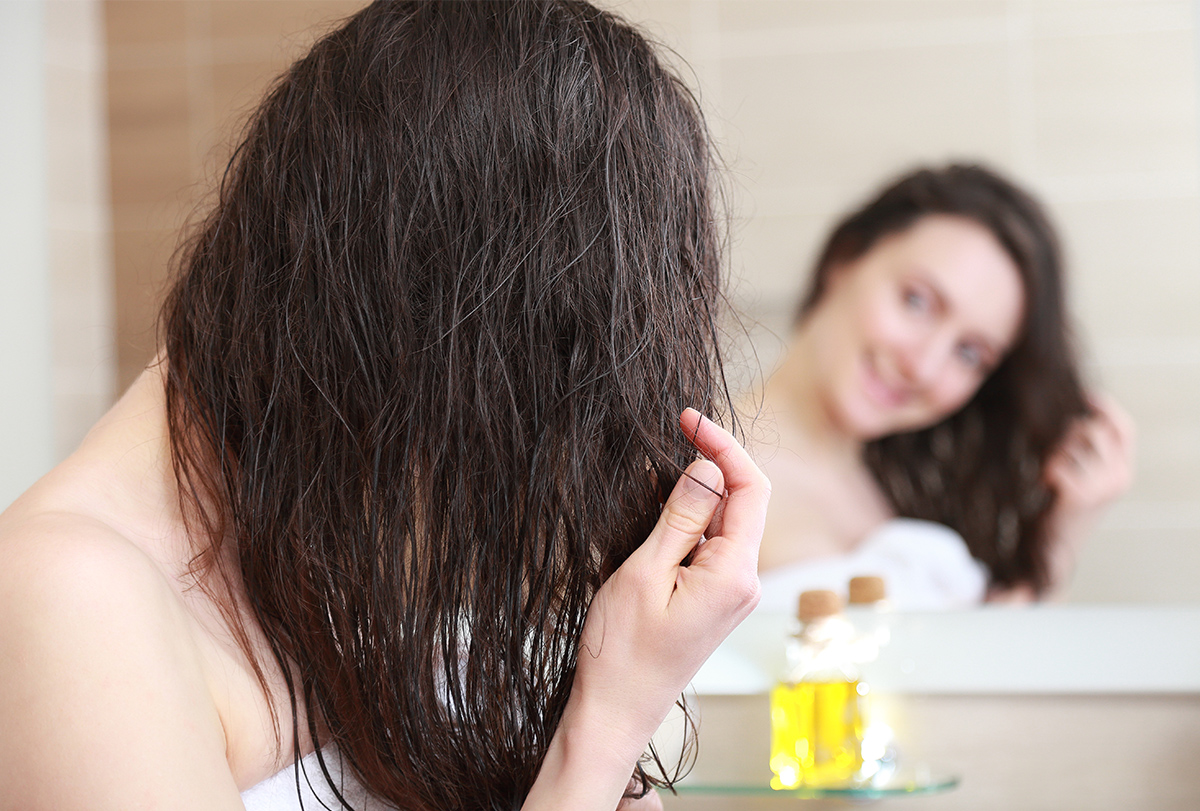
Hair oil is generally considered better than hair serum as it’s more natural, which is why it’s been used for centuries in Asian countries.
With a wide range of hair care products available on the market, it is common to confuse hair oils with hair serums. Even professionals and companies tend to use the terms interchangeably.
However, while hair serums are meant for smooth and shiny hair, hair oils nourish the scalp and hair and improve their health.
This article discusses the difference between hair oils and serums and their advantages and uses to help you determine which product is more suitable for you.
Difference Between Hair Oil and Hair Serum
| Hair Serum | Hair Oil |
|---|---|
| Makes the hair strands appear smooth, shiny, and healthy | Helps detangle the hair and control frizziness, while improving hair strength and volume |
| Coat the hair cuticle to protect it against friction, heat styling, and harsh combing or brushing | Penetrates the cuticle and strengthens the hair from the inside by replacing lipids in the hair with healthy fatty acids |
| Useful against hair damage induced by sun exposure and environmental pollution | Useful in hair repair, strengthening, and deep conditioning, which prevent dullness, dryness, split ends, and breakage |
| Can help manage split ends and hair dryness and are also widely used for hairstyling | Beneficial in the long run as it provides deep nourishment to the hair, helps in repairing damage, and promotes hair growth |
| To be applied daily or after hair wash on slightly damp hair or on other days to help manage dryness and frizziness | To be applied once or twice a week to nourish the hair. It can be used for massaging the hair before washing or as an overnight treatment |
About Hair Serums
Hair serums refer to hair care products that are commonly used as styling agents.
A hair serum covers the outer surface of the hair and protects, provides shine, and smoothens the hair. It also hydrates the hair and prevents it from tangling and frizziness. (1)
Depending on the formulation, a hair serum can also repair damage and provide protection from environmental pollutants.
Which hair serum to use
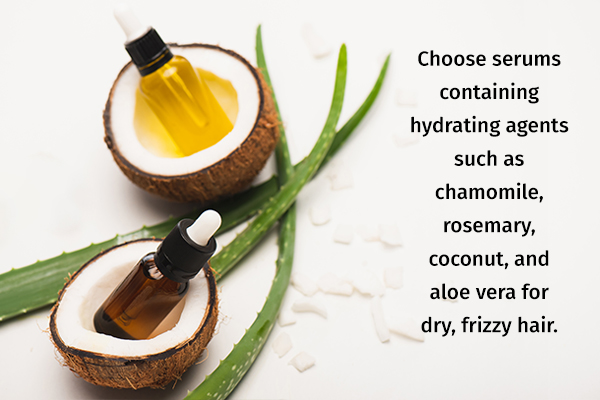
Hair serums contain different ingredients that address varying hair problems:
- Choose serums containing hydrating agents such as chamomile, rosemary, coconut, and aloe vera for dry, frizzy hair. (2)
- Lavender-containing serums can protect your hair from sun damage.
- Use green tea serums if you have chemically treated hair.
- Serums containing keratin are beneficial for hair prone to split ends.
Advantages of using hair serum
A hair serum poses multiple benefits to the hair, including:
- Prevention from fungal infection. Hair serums help prevent dandruff and thus, fungal infections.
- Added shine. Applying hair serums after washing the hair can give it a silky, smooth finish, nourishing the hair at the same time.
- Environmental protection. The serum forms a protective layer over the hair against heat, pollutants, humidity, UV rays, etc. (3)
- Softness. A small amount of hair serum goes a long way in softening your hair, making it feel supple and renourished.
- Damage prevention. Hair serums have low acidity that helps control inflammation and bind hair fibers, thus preventing hair damage.
How to apply hair serum
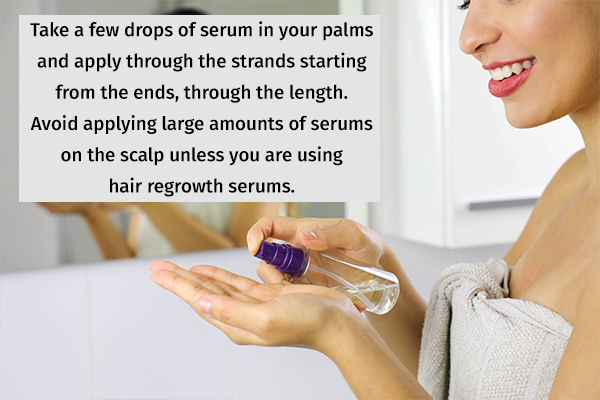
It is best to apply hair serum to slightly damp hair, preferably after shampooing.
Take a few drops of serum in your palms and apply to the strands, starting from the ends through the length. Avoid applying large amounts of serums to the scalp unless you are using hair regrowth serums that act on the scalp follicles rather than the shaft.
About Hair Oils
Hair oils are generally made from natural products that nourish the hair deeply. These have been long used, especially in South Asia, for healthy, shiny, strong, and long hair.
The ingredients found in hair oils can penetrate the strands, nourishing and hydrating them from the inside. Moreover, hair oils can improve hair damage, including dryness, breakage, frizzing, split ends, and fraying. Choose hair oils if you want to treat your hair from the inside.
Common oils for hair care
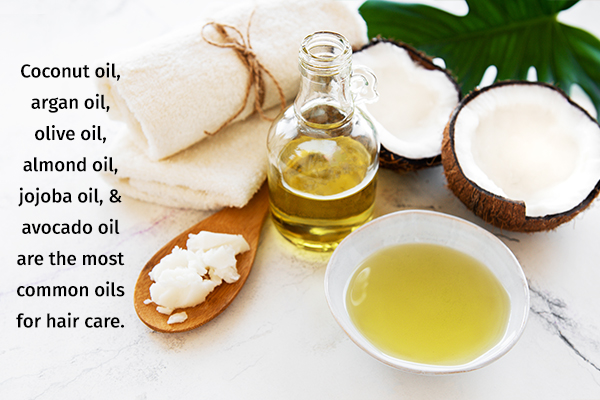
There are various hair oils, and the most common ones are:
1. Coconut oil
It is rich in fatty acids and vitamins that provide deep nourishment to the hair, making your mane long and full. Moreover, coconut oil can penetrate all hair types, prevent protein loss, and remove excess sebum from the hair follicles.
The lauric acid content of coconut oil makes it suitable for daily conditioning. (4)
2. Argan oil
Argan oil contains various nutrients such as vitamins A, C, and E, linoleic acid, antioxidants, and omega-6 fatty acids. (5) These compounds make organ oil highly suitable for conditioning the hair, making it shinier, softer, and frizz-free.
3. Olive oil
Rich in antioxidants, this oil is a natural moisturizer and conditioner. Moreover, it can aid in restoring hair health, boosting keratin, and preventing dandruff. It also softens, shines, and hydrates the hair.
4. Almond oil
This light oil contains proteins, fatty acids, antioxidants, magnesium, and vitamin E, which help reduce damage, promote hair growth, and even soften the hair on regular use.
5. Jojoba oil
Jojoba oil is primarily composed of monounsaturated fats (6), which can penetrate the hair cuticle and thus can nourish and condition the hair.
6. Avocado oil
Avocado oil contains the goodness of both antioxidants and omega fatty acids. (7) It also contains oleic acid, which helps the oil penetrate the hair shaft, moisturizing it from the inside. Moreover, avocado oil contains vitamins A, D, and E, which boost hair growth.
Benefits of applying hair oil
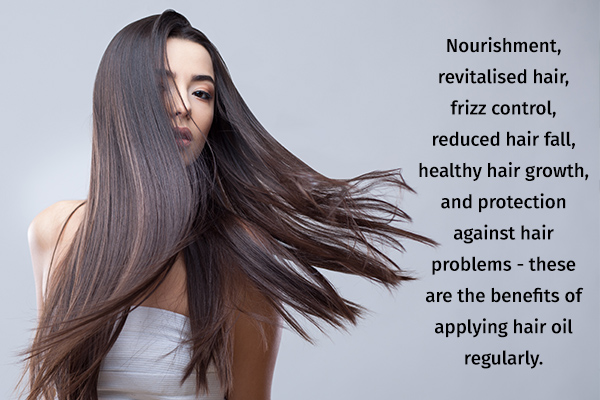
Regular use of hair oil can benefit the hair in the following ways:
- Nourishment. The nutrients in hair oils contribute to hair growth, softness, and shine. The deeply nourishing and moisturizing properties of hair oils help overcome dryness and dullness.
- Revitalization. Massaging your hair with oils can help the nutrients penetrate the skin layers, thus revitalizing the skin tissue. This, in turn, improves the texture of your hair.
- Frizz control. Using a few drops of hair oil can control frizzy hair while providing bounce and nourishment at the same time.
- Hair fall reduction. Hair oils help prevent hair fall and even boost hair regrowth. Regular massages with hair oil can prevent thinning of hair.
- Healthy hair growth. Applying hot oil to the scalp and hair enhances blood circulation and nutrient supply to the hair follicles. Massaging your scalp with hot oil can help the hair grow fast and healthy.
- Protection against hair problems. Many hair oils possess antimicrobial and antifungal properties that can help treat folliculitis. Additionally, the antibacterial and anti-inflammatory nature of a few hair oils can prevent and improve dandruff.
How to apply hair oil
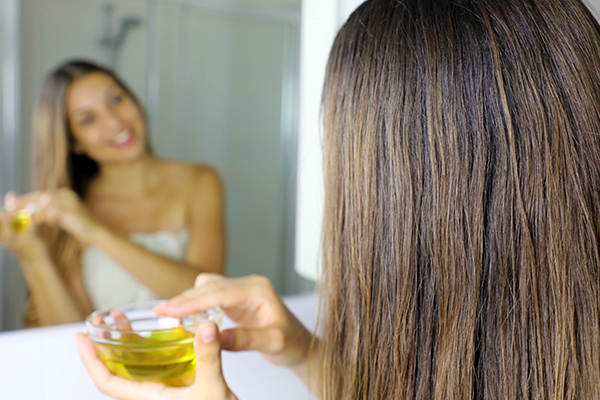
Hair oils should be applied to the shaft evenly, starting from the scalp to the hair tips. When used as a before-wash treatment, massage the scalp with hair oil and divide the hair into sections for easy and thorough application.
However, avoid touching the hair roots if you are applying oils after washing the hair or during the day. Use generous amounts of the oil, depending on your hair length, thickness, and type.
Most-Asked Questions About Hair Oils and Serums
Can hair serums and oils be used together?
Hair serums and hair oils, when used together, can give immense benefits. First, apply the serum to hydrate the hair after towel-drying. Then, apply a light coat of hair oil to lock in the moisture.
Avoid using oils on the hair roots, as it gives a greasy appearance. You can also use hair oils or serums on the days that you don’t wash your hair to rehydrate it.
When to apply hair oils and serums?
Different hair oils serve different purposes and, therefore, can be applied at different stages of hair care, depending on your hair type. You may use hair oils for an overnight treatment, during blow-drying the hair, or even before washing the hair.
Hair serums, on the other hand, are best applied to damp hair. You can also use it for midday touch-ups to add shine to your hair. Avoid applying serum to dirty hair.
Which is Better?
Hair serums are products that coat your hair externally and add shine and softness. Hair oils, on the other hand, penetrate the hair strands and nourish them from the inside.
Therefore, it is better to use serums for styling and improving the appearance of your hair, while oils should be used to make hair healthy and repair the damage. It is best to check the ingredients of hair products before buying, as some companies may advertise their hair oils as serums or vice versa.
As a general rule, products containing more synthetic ingredients should be avoided.
- Was this article helpful?
- YES, THANKS!NOT REALLY


